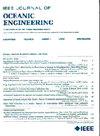单载波水声通信的延迟-多普勒域Turbo均衡
IF 3.8
2区 工程技术
Q1 ENGINEERING, CIVIL
引用次数: 0
摘要
单载波调制是高速水声通信中常用的一种方法,它需要在接收机处进行均衡。然而,在快速时变信道中,其性能仍然不是最优的。最近,延迟多普勒(DD)域调制,如众所周知的正交时频空间(OTFS)调制,因其在高动态环境中提供更可靠通信的能力而引起了相当大的关注。OTFS本质上是一种在DD域中实现多载波调制的预编码正交频分复用(OFDM)方法,但它仍然具有较高的峰值平均功率比(PAPR)。为了保持单载波系统的低PAPR特性,同时提高在快速时变信道中的性能,本文提出了一种基于最小均方误差(DD- mmse - teq)的单载波水声通信DD域turbo均衡器。所提出的均衡器包括一个DD域均衡器和一个时域解码器。具体而言,由于DD域变换固有的将时变信道转换为准静态信道的能力,该方法对高多普勒扩频具有更强的鲁棒性。此外,DD域均衡器和时域解码器通过幺正变换促进了跨域软信息交换,从而降低了误差传播的概率,提高了迭代均衡的性能。仿真结果表明,所提出的DD-MMSE-TEQ优于频域turbo均衡,但代价是接收机的额外计算复杂度,并且在误码率(BER)方面达到与传统OTFS相当的性能水平。该方法已通过2022年7月在中国河南省丹江口水库进行的多次实验收集的水下实验数据进行验证。结果表明,该方法在误码率方面优于其他比较方法。本文章由计算机程序翻译,如有差异,请以英文原文为准。
Delay-Doppler Domain Turbo Equalization for Single-Carrier Underwater Acoustic Communications
Single carrier modulation, a commonly used method in high-speed underwater acoustic communications, requires equalization at the receiver. However, its performance remains suboptimal in rapidly time-varying channels. Recently, delay-Doppler (DD) domain modulation, such as the well-known orthogonal time frequency space (OTFS) modulation, has garnered considerable attention for its ability to provide more reliable communication in highly dynamic environments. OTFS is essentially a precoded orthogonal frequency division multiplexing (OFDM) method that implements multicarrier modulation in the DD domain, yet it still has a high peak-to-average power ratio (PAPR). To maintain the low PAPR characteristic of single-carrier systems while enhancing performance in rapidly time-varying channels, this article proposes a DD domain turbo equalizer based on minimum mean square error (DD-MMSE-TEQ) for single-carrier underwater acoustic communications. The proposed equalizer comprises a DD domain equalizer and a time-domain decoder. Specifically, due to the inherent ability of DD domain transformation to convert time-varying channels into quasi-static channels, the proposed method demonstrates increased robustness to high Doppler spread. Moreover, through unitary transformation, the DD domain equalizer and time-domain decoder facilitate cross-domain soft information exchange, thereby reducing the probability of error propagation and enhancing the performance of iterative equalization. Simulation results indicate that the proposed DD-MMSE-TEQ outperforms frequency-domain turbo equalization at the cost of additional computational complexity at the receiver and achieves performance levels comparable to conventional OTFS in terms of bit error rate (BER). The proposed method has been validated using underwater experimental data collected from multiple experiments conducted in the Danjiangkou Reservoir, Henan Province, China, in July 2022. The results confirm that the proposed method surpasses other comparison methods in terms of BER.
求助全文
通过发布文献求助,成功后即可免费获取论文全文。
去求助
来源期刊

IEEE Journal of Oceanic Engineering
工程技术-工程:大洋
CiteScore
9.60
自引率
12.20%
发文量
86
审稿时长
12 months
期刊介绍:
The IEEE Journal of Oceanic Engineering (ISSN 0364-9059) is the online-only quarterly publication of the IEEE Oceanic Engineering Society (IEEE OES). The scope of the Journal is the field of interest of the IEEE OES, which encompasses all aspects of science, engineering, and technology that address research, development, and operations pertaining to all bodies of water. This includes the creation of new capabilities and technologies from concept design through prototypes, testing, and operational systems to sense, explore, understand, develop, use, and responsibly manage natural resources.
 求助内容:
求助内容: 应助结果提醒方式:
应助结果提醒方式:


